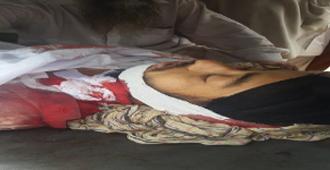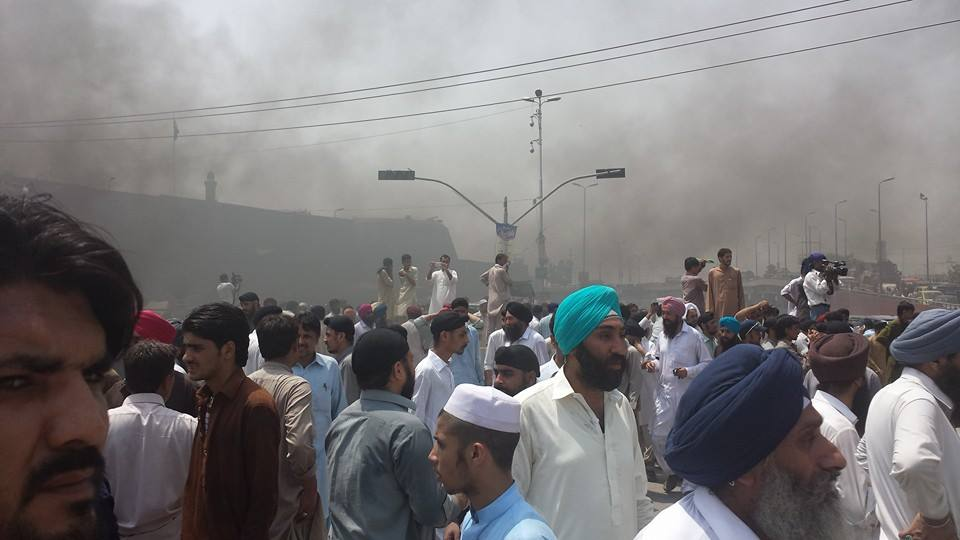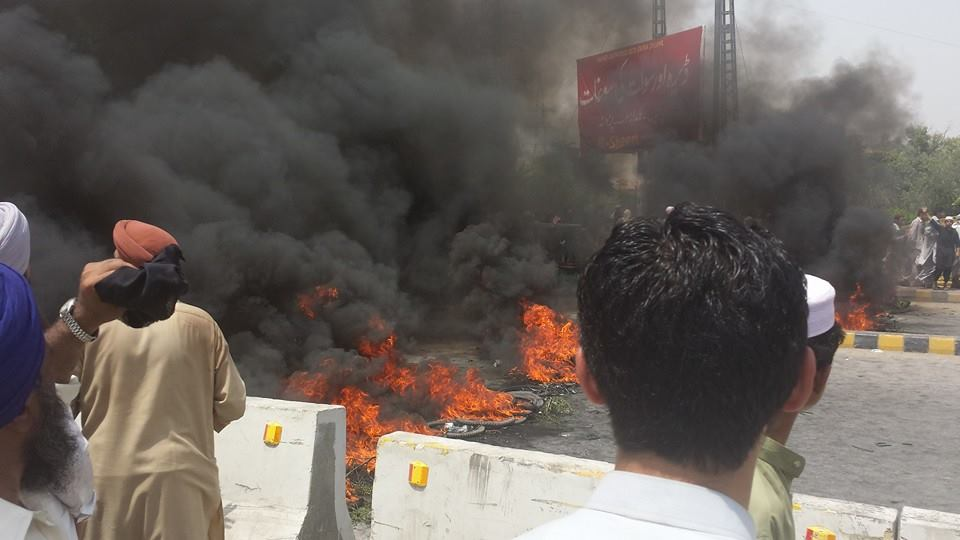 |
 |
Peshawar Sikhs Seek Asylum after Terror Campaign Takes Teenager's Life.
Another Sikh killed in his shop in NW Frontier yesterday.
Charanjit Singh, Head Granthi of Gurudwara Siri Bhai Joga Singh Peshawar, said this was not the first attack on the Sikh community. In the last eight months, many Sikhs have been killed and kidnapped and the government has failed to make any arrests. He further added, "If our community migrates to other parts of the country then militant groups will follow us. The government should give an alternative if it cannot give security; we ask the international community to help us in seeking asylum in any country we can live freely." |
 |
Action Taken by UNITED SIKHS for Sikhs in Peshawar, Pakistan
- UNITED SIKHS has been approached by 70 Sikh families in Peshawar who wish to apply for asylum. We have been meeting one-on-one with family members of those most vulnerable and receiving threats from different groups. There are approximately 800 families and approximately 7,000 Sikhs living in Peshawar.
- Since December 2009, UNITED SIKHS has provided assistance to rehabilitate affected families who had to flee their homes in the Federal Administered Tribal Areas (FATA) of Pakistan due to threats from the Taliban and the communal conflict. Read about our efforts at: https://unitedsikhs.org/pak
- We are in dialogue with the United States Department of State (DOS) to assure Sikhs in Peshawar are not forgotten and a solution is found for these families as soon as possible.
- We are reaching out to the Pakistan Embassy in Washington, DC to make sure they are going above and beyond in looking out for the Sikh community in Pakistan as tensions build.
- We have also approached Canadian MPs to take up the issue of asylum for Sikh victims of terror.
Peshawar, Pakistan - So far, 70 Peshawar Sikh families have sought UNITED SIKHS' help to obtain asylum following a campaign of terror, epitomised by the brutal killing of teenager Jagmohan Singh, when a gunman shot at Sikhs in a market area on 6th Aug 2014. The United States Department of State has assured UNITED SIKHS that it is investigating the situation faced by Sikhs in Peshawar.
Jagmohan Singh, a 17-year-old Sikh trader, died when he was shot and killed by an unknown gunman in the busy Shabab Market in the Hashtnagri area of Peshawar, in the North West Frontier region of Pakistan.
Two of Jagmohan's friends, Param Singh and Manmit Singh, were also injured when the gunman opened fire on them. According to local newspaper Daily Aaj, Al Qaeda leader Ameer Yousafraza Mujahid of Bajaur and Mohmand Agency claimed responsibility for killing Jagmohan in Peshawar. The group also warned of more attacks until the end of the military operation "Zarb-e- Azb" in North Waziristan Agency.
Following the murder of Jagmohan Singh, the Sikh community in Peshawar took to the streets to protest against the government's failure to protect members of minority communities. Protesters burned tires and blocked roads, including the Grand Trunk (GT) road in Peshawar.
Eyewitness Diva Singh said that the three victims were in their shops at the Shabab market in the Khush Hal Bazaar in Hashtnagri when a man entered the premises and opened fire. Alarmed, other shopkeepers closed their shops. Diya further stated that the attacker, who had come on a motorbike, did not face any resistance and escaped.
Now, on the afternoon of September 3, 2014, Aamarjeet Singh, was also stabbed to death inside his shop in Shaheedan Bazaar.
"The situation for minorities has worsened day-by-day since January 2014 due to bad law and order. The killing of Sikhs in Peshawar has created a lot of tension among the community and the government has told the community that it cannot protect them. The community has decided to migrate from Peshawar and leave this country," says Herdyal Singh, UNITED SIKHS Aid Project Coordinator, Pakistan.
 |
 |
Sikhs protest and burn tires on GT road
The United States Department of State (DOS) has assured UNITED SIKHS that:
- It has reached out to the United States Embassy in Pakistan to investigate into the situation. They will keep us apprised of all updates to the investigation.
- Cases in Peshawar were raised in the recent release of the Department of State 2013 Report found here:
http://www.state.gov/j/drl/rls/hrrpt/humanrightsreport/index.htm#wrapper. This report is used by embassies, agencies, and governments around the world to reference what issues to address in any given country. All new cases should be reported to their department so they may be added to next year's report. - For individuals under threat, DOS will assist on a case by case basis. Individual's contact information must be provided for the department to investigate their situation, and assist them.
History of Sikhs in Pakistan
Before 2007, the majority of Pakistan's Sikhs were peacefully living in Khyber Agency, Orakzai Agency, and Khurram Agency of the Federal Administered Tribal Areas (FATA). In 2008, the situation for the Sikh community tensed when local Taliban in Khyber agency demanded jazya (protection tax). In March 2009, the Taliban demanded a large jazya tax and threatened the community to: pay jazya, fight with Jihad, and convert. The Sikh community paid jazya and fled from the area. In May 2009, the government started military operations against Taliban resulting in millions of displaced people including approximately 500 Sikh and Hindu families. In January 2010, the Taliban kidnapped three Sikhs from the border of Khyber and Orakzai agency, one of whom was beheaded. The other two were later rescued.
When military operations began in the BARA areas of Khyber Agency, thousands of Internally Displaced Persons (IDPs) were displaced, including these 70 Sikh families wishing to seek asylum, who had left their homes and shops to take shelter in Peshawar and Panja Sahib. Militant groups again threatened Sikhs in Peshawar. Many have been kidnapped for ransom, been killed, and have been receiving threatening letters to leave the country. For further details click here: https://www.unitedsikhs.org/pak
If you or anyone you know is a member of the Peshawar Sikh community, please contact us at: law-global@unitedsikhs.org for help today.
We are committed to assisting in every way we can and need your continued support so we may continue to advocate for Sikhs around the world: www.unitedsikhs.org/donate
Read an earlier press release on UNITED SIKHS Pakistan IDP efforts at: https://unitedsikhs.org/PressReleases/PRSRLS-31-01-2013-00.html
Issued by:
Anisha Singh
Staff Attorney
International Civil and Human Rights Advocacy
law-global@unitedsikhs.org



